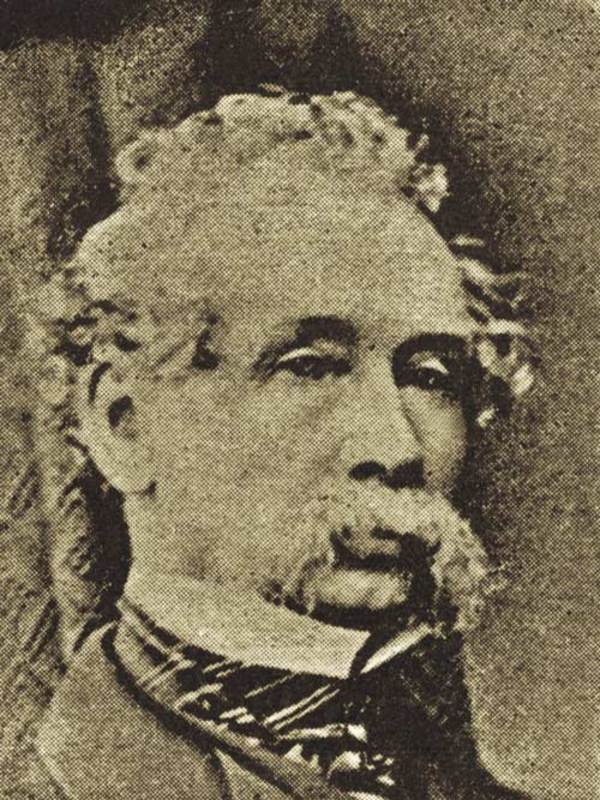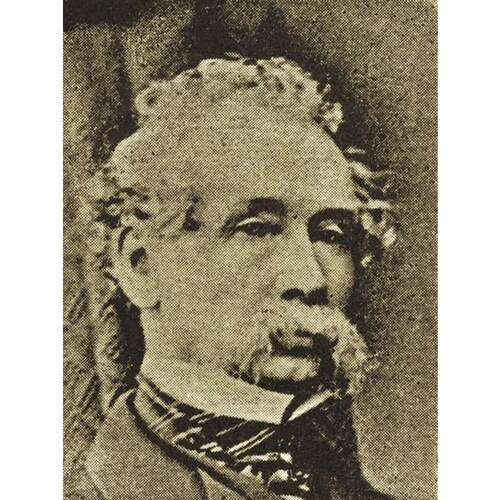
Source: Link
BAILLIE HAMILTON, KER (he signed Ker B. Hamilton), soldier and colonial administrator; b. 13 July 1804 at Cleveland (North Yorkshire), England, son of the Reverend Charles Baillie Hamilton and Lady Charlotte, daughter of the 9th Earl of Home; m. 19 April 1834 Emma Blair, and they had five daughters; d. 6 Feb. 1889 at Tunbridge Wells (Royal Tunbridge Wells), England.
Ker Baillie Hamilton was educated at the Royal Military Academy, Woolwich (now part of London), and in 1822 entered the Indian military service. In the course of 1826 he was appointed a writer in the civil service and private secretary to the governor of Mauritius, thus beginning a career in colonial administration. He became clerk of the Executive Council and acting colonial secretary of the Cape of Good Hope in 1829, lieutenant governor of Grenada in 1846, and administrator of Barbados and the Windward Islands in 1851.
The following year Baillie Hamilton was named governor of Newfoundland. Despite his 30 years of colonial experience he was not prepared for the turbulent politics of Newfoundland. He was not used to dealing with colonial liberals, and, as an extreme evangelical churchman, he disliked not only Roman Catholics, such as Bishop John Thomas Mullock*, but also high church Anglicans, such as Bishop Edward Feild*. Moreover, his colonial experiences and his aristocratic and clerical connections (his father was an archdeacon and his brother-in-law a bishop) predisposed him to seek to direct political and church affairs in the colony. An impartial and mediating role was alien to his nature.
Baillie Hamilton arrived in Newfoundland in the midst of the Liberal campaign for responsible government. The Liberals, led by Philip Francis Little*, welcomed Baillie Hamilton’s support of their proposals in 1853 for reciprocity with the United States but were quickly antagonized when they discovered his opposition to responsible government. The agitation for responsible government had started in the 1840s and had received the open and powerful support of Mullock. Hamilton’s predecessor as governor, Sir John Gaspard Le Marchant*, however, had declared the colony unfit even for representative institutions. Baillie Hamilton in his first confidential dispatch (which the secretary of state for the colonies, the Duke of Newcastle, thought excellent) opposed any constitutional change in Newfoundland because its small, scattered fishing population had little education and no experience of self-government through municipal institutions. He stated that the other North American colonies had prospered for three-quarters of a century under the system that Newfoundland now had, and that Newfoundlanders were too busy discussing abstract theories to deal with actual problems. He also lamented that the parties had split on religious lines and that the Roman Catholics, although a minority, were united in political action and could triumph at the polls over Protestants who were divided by denominational differences.
To counteract Baillie Hamilton’s dispatch, Little and Robert John Parsons went to England to enlist the aid of the leading Radical, Joseph Hume, in persuading Newcastle to grant responsible government. They were successful and on 22 March 1854 news of Newcastle’s decision reached the island. Newcastle felt that, although Newfoundland would perhaps be the severest test of responsible government, the colony should be allowed the same treatment as the rest of British North America. Baillie Hamilton’s position was thus undermined. He sought to redeem it by insisting on implementation, in a manner not inimical to Protestant interests, of the three conditions set by Newcastle: the doubling of the number of seats in the assembly, an end to the payment of members’ expenses from the colony’s treasury, and the granting of pensions to colonial officials whose jobs were eliminated by the change in the governing system. When the assembly agreed in its representation bill to double the number of seats, but in such a way as to favour the Liberals, the Legislative Council rejected the measure with Baillie Hamilton’s full support. Sir George Grey, the new colonial secretary, urged Baillie Hamilton to act as an impartial arbitrator and to mediate in the deadlock between the houses; Baillie Hamilton refused, despite the Colonial Office’s displeasure. The assembly refused to conduct any business, and it was decided in June 1854 to send delegations to England. Little and Parsons represented the interests of the assembly, Edward Mortimer Archibald and William Bickford Row*, the council; Hugh William Hoyles, the leader of the opposition in the assembly, was sent by the Central Protestant Committee. The deadlock was finally broken on 9 November, not by the governor but by the office-holders in the council who feared losing their pensions if they did not agree to the original proposal. Peace was not immediately established, however, because Baillie Hamilton, thinking that winter elections would disenfranchise Protestant voters in the remote northern and southern areas, decided to postpone polling until May 1855. According to Baillie Hamilton, Little threatened him with “consequences injurious to himself personally” if elections were not soon held; however, Baillie Hamilton remained adamant, supported by the Colonial Office.
As well as battling with the Liberals, Baillie Hamilton had also entered enthusiastically and even with rancour into the conflict between Feild and a group of wealthy merchants of St John’s and Harbour Grace led by the evangelical William Thomas. Three questions were at issue: the appointment of an incumbent to succeed the Reverend Charles Blackman* at St Thomas’ Church, St John’s; the refusal of sacraments to Anglicans unwilling to give financial support to their church; and the employment of clergymen whom the bishop refused to license. Baillie Hamilton saw himself as the evangelical Protestant champion facing the Tractarian bishop, and he complained about Feild to the Society for the Propagation of the Gospel. Letters appeared in 1854 in two religious newspapers in London, the Record and the Guardian, about the controversy, and Feild threatened to protest publicly to the colonial secretary about Baillie Hamilton’s interference; comparative calm was restored only when he left Newfoundland. Although Baillie Hamilton was prepared to continue as governor under responsible government, the Colonial Office felt he would do better elsewhere and transferred him to Antigua in March 1855. Charles Henry Darling* succeeded him in Newfoundland.
Baillie Hamilton proved to be a successful governor for the next 12 years in Antigua and the Leeward Islands. In 1867 he retired to Tunbridge Wells, where he lived quietly until his death. The historian Daniel Woodley Prowse*, although commending his “liberal and enlightened views” on telegraphic and steam communication and his “very able despatches” on the French shore question, condemns Baillie Hamilton for being “as unfit a man as the British Government could possibly have selected to fill a difficult position.” Newfoundland was clearly a difficult colony to administer, and there is no doubt that Ker Baillie Hamilton exacerbated any conflict into which he entered.
Guildhall Library (London), Commonwealth and Continental Church Soc., Newfoundland School Soc., Committee minutes, 1839–80; Reports, 1823–80. PRO, CO 194/139–42; CO 195/21–22. USPG, D9A, D9B. The Church of England in Newfoundland, as indicated in a correspondence between Thomas E. Collett and the lord bishop of Newfound land and the Rev. W. K. White . . . (St John’s, [1853]). H. W. Hoyles, Case of the Protestant inhabitants against the unconditional concession of responsible government (London, 1854). John Little, The constitution of the government of Newfoundland, in its legislative and executive departments . . . ([St John’s], 1855). Guardian (London), 5, 12, 25 April, 24 May 1854. Record (London), 23, 30 March 1854. Times (London), 9 Feb. 1889. Times and General Commercial Gazette (St John’s), 3 June 1854. Gunn, Political hist. of Nfld. Prowse, Hist. of Nfld. (1896). Wells, “Struggle for responsible government in Nfld.” Frederick Jones, “The early opposition to Bishop Feild of Newfoundland,” Canadian Church Hist. Soc., Journal (Glen Williams, Ont.), 16 (1974): 30–41.
Cite This Article
Frederick Jones, “BAILLIE HAMILTON, KER (Ker B. Hamilton),” in Dictionary of Canadian Biography, vol. 11, University of Toronto/Université Laval, 2003–, accessed March 1, 2026, https://www.biographi.ca/en/bio/baillie_hamilton_ker_11E.html.
The citation above shows the format for footnotes and endnotes according to the Chicago manual of style (16th edition). Information to be used in other citation formats:
| Permalink: | https://www.biographi.ca/en/bio/baillie_hamilton_ker_11E.html |
| Author of Article: | Frederick Jones |
| Title of Article: | BAILLIE HAMILTON, KER (Ker B. Hamilton) |
| Publication Name: | Dictionary of Canadian Biography, vol. 11 |
| Publisher: | University of Toronto/Université Laval |
| Year of publication: | 1982 |
| Year of revision: | 1982 |
| Access Date: | March 1, 2026 |



